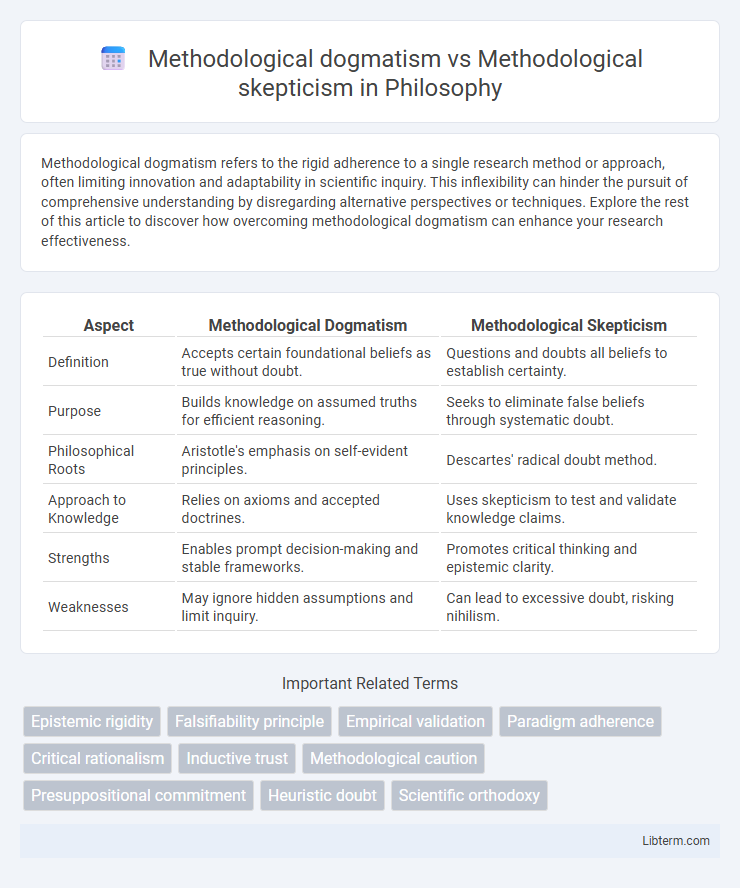Methodological dogmatism refers to the rigid adherence to a single research method or approach, often limiting innovation and adaptability in scientific inquiry. This inflexibility can hinder the pursuit of comprehensive understanding by disregarding alternative perspectives or techniques. Explore the rest of this article to discover how overcoming methodological dogmatism can enhance your research effectiveness.
Table of Comparison
| Aspect | Methodological Dogmatism | Methodological Skepticism |
|---|---|---|
| Definition | Accepts certain foundational beliefs as true without doubt. | Questions and doubts all beliefs to establish certainty. |
| Purpose | Builds knowledge on assumed truths for efficient reasoning. | Seeks to eliminate false beliefs through systematic doubt. |
| Philosophical Roots | Aristotle's emphasis on self-evident principles. | Descartes' radical doubt method. |
| Approach to Knowledge | Relies on axioms and accepted doctrines. | Uses skepticism to test and validate knowledge claims. |
| Strengths | Enables prompt decision-making and stable frameworks. | Promotes critical thinking and epistemic clarity. |
| Weaknesses | May ignore hidden assumptions and limit inquiry. | Can lead to excessive doubt, risking nihilism. |
Introduction to Methodological Dogmatism and Skepticism
Methodological dogmatism assumes the reliability of sensory experience and rational processes as a foundation for acquiring knowledge, emphasizing confidence in established methods and accepted truths. In contrast, methodological skepticism adopts a systematic doubt approach, questioning the certainty of knowledge claims to eliminate errors and achieve more secure understanding. These contrasting approaches shape epistemological inquiry by balancing trust in evidence with critical scrutiny to refine how knowledge is validated.
Defining Methodological Dogmatism
Methodological dogmatism refers to the unwavering adherence to established scientific methods and principles, assuming their absolute reliability without questioning underlying assumptions. This approach prioritizes consistency and predictability in research outcomes by strictly following traditional protocols. It contrasts sharply with methodological skepticism, which encourages constant doubt and critical evaluation of all methods to refine knowledge acquisition.
Understanding Methodological Skepticism
Methodological skepticism emphasizes doubting all beliefs to establish a firm foundation for knowledge, contrasting with methodological dogmatism which accepts assumptions without question. This approach involves systematic questioning and critical analysis to eliminate false beliefs and identify certainty. By applying rigorous doubt, methodological skepticism fosters deeper understanding and more reliable knowledge acquisition.
Historical Perspectives on Methodological Approaches
Methodological dogmatism, rooted in rigid adherence to established scientific principles, dominated early philosophical and scientific inquiry, exemplified by thinkers like Aristotle who emphasized deductive reasoning and fixed truths. In contrast, methodological skepticism, championed by Rene Descartes and later empiricists, advocated systematic doubt and continuous questioning to refine knowledge. Historical shifts from dogmatism to skepticism paved the way for empirical methods and the modern scientific method, emphasizing evidence-based inquiry and critical re-evaluation of assumptions.
Key Differences Between Dogmatism and Skepticism
Methodological dogmatism asserts fixed principles and unquestioned truths as the basis for knowledge, emphasizing certainty and absolute beliefs. In contrast, methodological skepticism relies on systematic doubt and critical inquiry, continuously questioning assumptions to achieve more reliable knowledge. The key difference lies in dogmatism's acceptance of established doctrines versus skepticism's emphasis on perpetual inquiry and evidence-based validation.
Advantages of Methodological Dogmatism
Methodological dogmatism ensures a consistent framework for scientific inquiry, enabling researchers to build upon established theories and maintain coherence in their methodologies. This approach facilitates efficiency by reducing doubt and indecision during experimental design and hypothesis testing. Emphasizing confidence in foundational principles allows for rapid knowledge accumulation and clearer communication within scientific communities.
Benefits of Methodological Skepticism
Methodological skepticism enhances critical thinking by systematically questioning assumptions and requiring empirical evidence before accepting claims, leading to more robust and reliable conclusions. This approach reduces cognitive biases and prevents premature commitment to faulty theories, thereby fostering scientific rigor and intellectual humility. Emphasizing continuous inquiry and verification, methodological skepticism promotes adaptive learning and innovation across disciplines.
Potential Pitfalls and Limitations of Both Approaches
Methodological dogmatism risks entrenching biases by rigidly adhering to established theories, which can stifle innovation and blind researchers to alternative explanations. Methodological skepticism, while promoting critical inquiry, may lead to excessive doubt and paralysis, hindering the acceptance of well-supported knowledge. Both approaches face limitations: dogmatism restricts intellectual flexibility, and skepticism can delay consensus and practical application in scientific progress.
Methodological Approaches in Contemporary Research
Methodological dogmatism in contemporary research emphasizes adherence to established frameworks and theories, ensuring consistency and reliability through tested protocols. Methodological skepticism promotes critical evaluation and continuous questioning of assumptions, encouraging innovation and adaptation in research design. Balancing these approaches enhances scientific rigor by combining structured validation with openness to new insights and methodological improvements.
Balancing Dogmatism and Skepticism: Finding an Effective Middle Ground
Balancing methodological dogmatism and skepticism involves integrating firm theoretical commitments with critical inquiry to optimize scientific progress. Excessive dogmatism risks intellectual rigidity, while extreme skepticism can hinder knowledge acquisition by fostering perpetual doubt. An effective middle ground employs provisional acceptance of theories combined with rigorous testing and openness to revision, promoting both stability and adaptability in research methodologies.
Methodological dogmatism Infographic

 libterm.com
libterm.com